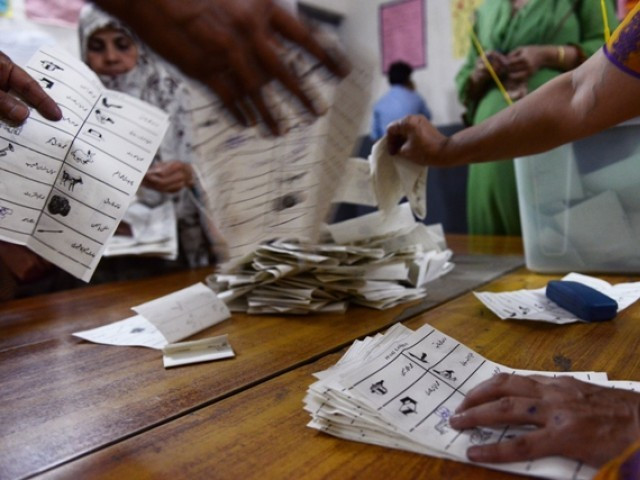Elections are not free unless verifiable
Making elections verifiable is not just about transparency, but also empowering voters, making them more contestable

PHOTO: AFP
From an early period, Pakistan’s politics has revolved around powerful personalities who have used the electoral system to convert their de facto power into de jure power. These brokers derive their political strength from their control of economic resources, state machinery, and patronage networks. Elections in this milieu are carefully managed theatres where candidates display their superior ability to mobilise brokered networks. Once elected, these powerful brokers protect their turf both within political parties and at the national stage. It is no wonder, then, that elections are quickly declared past and closed transaction. The traditional ritual for the political elite is to declare elections as suspect but then to accept the results in the name of democratic continuity. Apart from securing their own narrow political gains, these brokers have larger value for the wider system where unelected deal-makers, both national and international, draw on these brokers to cobble together loose coalitions that maintain the status quo. Some might go to the extent of arguing that elections are first brokered and then held. In this regard, the NRO was hardly an exception but part of an established practice of brokering deals before holding elections.
In this milieu, a continuously contested electoral space is an existential threat for local brokers, unelected power dealers and their international patrons. All efforts to make the electoral process verifiable thus run against the interests of a system that favours well-entrenched brokers. The question of electoral reform can, however, only be postponed not denied. Pakistan’s polity has witnessed some profound changes over the last two decades that make such reform an issue of existential importance. Growing urbanisation, a sustained youth bulge, greater female emancipation, electoral ‘big data’ (biometric electoral rolls database) and the fast inroads of the media and communication technology are posing new challenges to established political brokers. This was well-manifested in the robust voter turnout in the 2013 elections. Rarely has Pakistan witnessed such long queues outside polling stations, where ordinary people, both young and old, assembled to cast their vote despite a grave terrorist threat. Importantly, these elections drew out a large number of the chattering middle classes from their drawing rooms and into polling stations. While the poor have never lost faith in democracy, the renewed trust of Pakistan’s middle classes in the electoral process remains an unsung democratic victory. This is as significant an achievement as the historic transfer of power from one civilian government to another.
Sustained electoral reform is an essential pre-requisite for consolidating this democratic dividend. Unless preserved and cultivated, this renewed public confidence in participatory democracy can be easily lost. If the political elite are serious about electoral reform, they can benefit from the momentum for reform that has already been in place through a series of small steps taken during the previous government’s tenure. Preparing a first-ever database of error-free and transparent photo electoral rolls was one such step. Another significant reform was the introduction of mobile technology that liberated the voters’ list from shadowy display centres and polling agents, empowering them on the day of the election. Other key proposals for electoral reform that were considered but not approved included the biometric verification of voters, introduction of electronic voting machines and voting rights to overseas Pakistanis. Since these proposals required some advance planning, the thumbprint verification of voters using readable ink was broached as an interim, stop-gap arrangement to prevent electoral malpractices. While sincere efforts were made to plug the electoral gaps, post-election review suggests that the system was clearly subject to abuse. While there was not a single complaint or petition filed against the voters’ list, questions were raised on the conduct of polling staff. Even if one were to admit the absence of systematic rigging in the electoral process, the refusal to rectify the errors exposed by the 2013 elections remains a blight on the system.
Governance reform is not a single shot game; it is a continuous process that requires ongoing adjustments to meet public expectations. Even the best technology is susceptible to misuse. Creative innovation, whether in technology or governance, entails learning from failures. The standard of free, fair and transparent elections lies in their verifiability. This remains a core sticking point for established political brokers. There is a quiet consensus against genuine electoral reform. I observed this from close quarters. After the 2013 elections, more than 400 rigging complaints were filed in 14 election tribunals. NADRA was requested by these election tribunals to lend technical support for verifying thumb impressions of voters. The moment I started responding to such requests (which I had to as a binding constitutional requirement), I noticed a palpable unease and panic among the ruling circles. Rather than welcoming NADRA’s support for election tribunals, we were responded with victimisation and harassment.
Making elections verifiable is not just about electoral transparency, it is also about empowering voters and making elections more contestable. Biometric technology holds the key in any such discussion on electoral reform, but it is likely to be resisted, given that it will undercut the ability of local power brokers to manipulate elections. While genuine electoral reform runs against the interests of established political brokers, it is essential for securing the future of our younger generation. As Nelson Mandela once said, “A politician thinks about the next election, while leaders think for the next generation.” Isn’t it time to think about our next generation?
Published in The Express Tribune, September 1st, 2015.
Like Opinion & Editorial on Facebook, follow @ETOpEd on Twitter to receive all updates on all our daily pieces.
















COMMENTS
Comments are moderated and generally will be posted if they are on-topic and not abusive.
For more information, please see our Comments FAQ